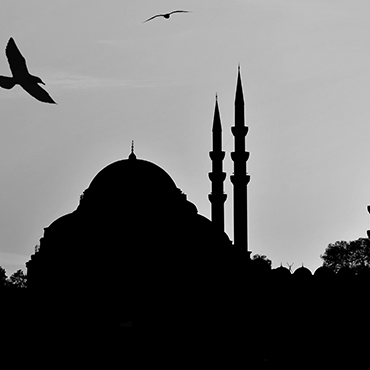IS WAGNER WADING INTO THE MIDEAST'S NEWEST CONFLICT?
Rumors are swirling that Russia's most notorious mercenary outfit intends to supply Lebanon's Hezbollah terrorist group with units of the SA-22 air defense system. While Washington has not confirmed shipment, officials are said to be monitoring conversations involving the Wagner Group and the Shi'ite militia. The potential arms deal has raised concerns because of its connection to the adjacent conflict now underway between Israel and Hamas; the Kremlin has refused to condemn the Palestinian extremist group for its October 7th terrorist attack on Israel, which claimed some 1,200 lives, and subsequently hosted a delegation of Hamas officials in Moscow. Ongoing concerns that Hezbollah might initiate a northern front against Israel have prompted the U.S. to deploy aircraft carriers to the Eastern Mediterranean. (Wall Street Journal, November 2, 2023)
QATAR BROKERS THE RETURN... OF UKRAINIAN CHILDREN
In the aftermath of Hamas' October 7th rampage in southern Israel, the Gulf nation of Qatar has taken on a prominent role in helping negotiate the return of the hostages taken by the terrorist group – a process that is ongoing as of this writing. The Gaza war, however, is not the only example of Doha's dabbling in hostage diplomacy. The Qatari government has also played a significant role in mediating between Russia and Ukraine for the return of at least some of the 200,000 children Kyiv estimates have been taken by Moscow since the start of the Kremlin's war of aggression. In mid-October, a Qatari government spokesperson announced that the first four Ukrainian children would be repatriated in the coming days in what it termed a "test case" for a dispute mechanism established after months of quiet negotiations. As yet, however, it is not clear whether Qatar's mediation will lead to the return of more than a nominal number of Ukrainian minors. (Kyiv Post, October 16, 2023)
THE GEOPOLITICAL COSTS OF THE UKRAINE WAR...
As its war in Ukraine approaches its second anniversary, the geopolitical costs for the Kremlin in its "near abroad" are mounting, a new analysis by the Wall Street Journal details. Among the signs of growing regional nervousness about Russia, the paper notes, was the first-ever summit of the leaders of all five Central Asian states that took place on the sidelines of the UN General Assembly meeting in New York earlier this Fall. Nor is Central Asia an outlier. "In most... countries across Moscow's former empire," the Journal outlines, "Russian influence has declined markedly as both its economy and military reputation were damaged by the failure to win in Ukraine, where a grinding war has now lasted 20 months." (Wall Street Journal, November 3, 2023)
...AND THE HUMAN ONES
The human toll of Moscow's misadventure, meanwhile, continue to mount. According to James Heappey, Britain's Minister of State for the Armed Forces, 302,000 Russian soldiers have been killed or wounded as a result of Russian President Vladimir Putin's February 2022 decision to invade neighboring Ukraine. Ukraine's government, meanwhile, puts the tally at a bit larger; more than 315,000 Russian military personnel dead or wounded. Those figures, the New York Sun notes, represent massive losses of manpower: "Either set of figures indicates that Russia has lost in 21 months more than four times the 68,700 Soviet soldiers killed or wounded during the Soviet Union's decade in Afghanistan." (New York Sun, November 17, 2023)
GOODBYE TO THE CFE
Russia has officially left the 1990 Treaty on Conventional Armed Forces in Europe (CFE). The CFE imposed restrictions on the deployment of conventional weapons on both the nations of NATO and members of the now-defunct Warsaw Pact. Russia ratified a revised CFE in 1999, following the dissolution of the Soviet Union. However, Russia suspended its involvement with the treaty in 2007 and withdrew from its consulting group in 2015, citing a failure by NATO countries to ratify the updated accord. Moscow has attributed its latest decision to NATO's involvement in Ukraine, the bloc's approval of Finland's membership, and its consideration of Sweden's application. (The Moscow Times, November 7, 2023)
MOSCOW SEEKS A LIBYAN FOOTHOLD
Russia's strategic footprint in Africa continues to deepen. Russian officials are said to be in talks to establish military bases in the North African nation, working through the forces of rebel warlord Khalifa Haftar, who controls the eastern part of the country. Haftar met with Russian President Vladimir Putin earlier this Fall, paving the way for stepped up cooperation – and Kremlin support for his bid for national power. As part of those ties, Russia may soon be given naval docking rights in the Mediterranean port city of Tobruk in exchange for stepped up military supplies (such as air defenses) to augment the capabilities of Haftar's militia.
The news has U.S. observers on edge. "Keeping Russia out of the Mediterranean has been a key strategic objective — if Russia obtains ports there, that gives it the ability to spy on all of the European Union," says Jonathan Winer, who served as the State Department's special envoy for Libya during the Obama administration. (Bloomberg, November 5, 2023)
Want these sent to your inbox?
Subscribe
Russia Policy Monitor No. 2609
Related Categories:
Arms Control and Proliferation; Democracy and Governance; Economic Sanctions; Europe Military; Human Rights and Humanitarian Issues; Islamic Extremism; Public Diplomacy and Information Operations; Terrorism; Warfare; NATO; CAMCA; Border Security; Europe; Middle East; Lebanon; Libya; Qatar; Russia; Ukraine




